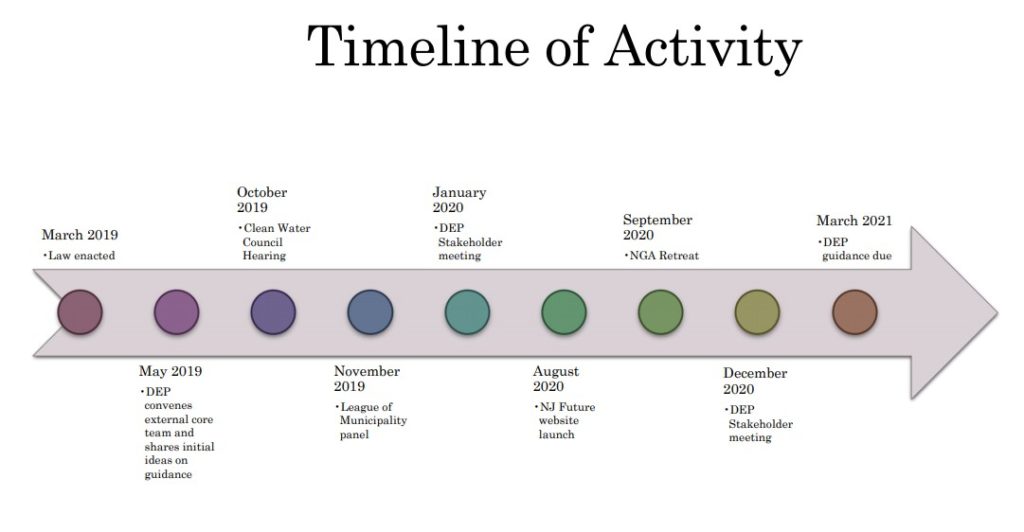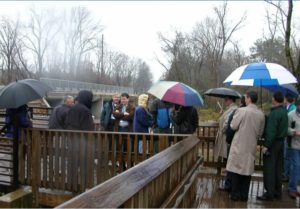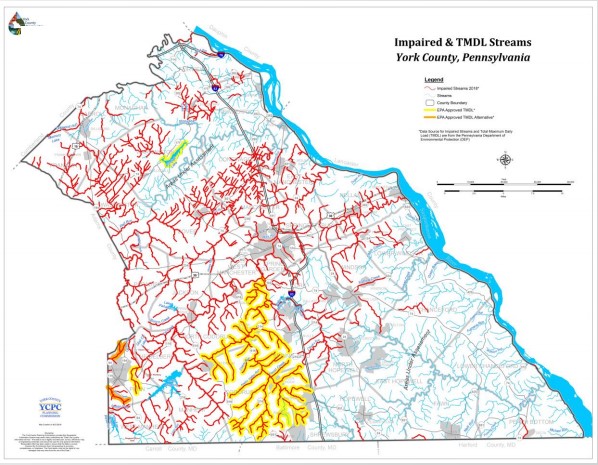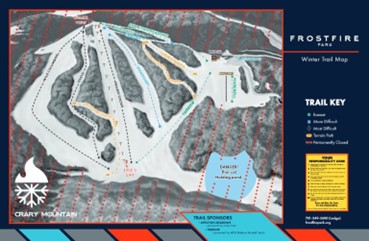This virtual in-state retreat provided assistance for the New Jersey Department of Environmental Protection (DEP) in their final development of guidance and resources for local jurisdictions considering developing a stormwater utility, and helped prepare local governments to implement a utility.
Virtual Event: 16-17 September 2020
Introduction
While the ongoing public health crisis COVID-19 has severely affected state and local budgets, potentially reducing the near term of adoption of municipal stormwater utilities, local jurisdictions can begin to lay the groundwork now. This retreat will include action planning for municipalities to consider strategies they can begin to implement such as public outreach and education on the needs and benefits of a stormwater utility, building a coalition of public, private and regional partners, and examination of financing options. Funds generated by these utilities will be used to install, operate, and maintain infrastructure and other activities to improve water quality for the Delaware River and waters statewide.
Presentations
- Background on Stormwater Utility Legislation and Purpose of Retreat – NJDEP
- Messaging and Public Relations: Addressing Local Concerns – Watson and Suslovic
- Local Stormwater Utility Implementation Process: Lessons Learned – Pasquel
- Laying the Groundwork for Rate Setting – Mason and Watson
- Developing a Regional Approach for Cost Effectiveness – Shellenberger and Pasquel
- Master Slide Deck
Background
The Delaware River provides drinking water for 1.9 million people in New Jersey and supports millions of dollars of economic activity through industry, agriculture, and outdoor recreation. Like many water bodies nationwide, stormwater pollution and groundwater depletion threaten the Delaware River. Developing a stormwater utility will provide a stable funding source that local jurisdictions can leverage with private dollars and will help accelerate infrastructure improvements and installation of practices to minimize and treat polluted runoff and replenish groundwater reserves. These actions will enable New Jersey to continue to rely on the Delaware River for clean and abundant drinking water, wildlife habitat and water supply for recreational, industrial, and agricultural needs.
Legislation signed into law by Governor Murphy on March 18, 2019, titled “Clean Stormwater and Flood Reduction Act” (Stormwater Utility Act) authorizes local jurisdictions to establish stormwater utilities that assess user fees based on the contribution of stormwater runoff from a property. The funds will help finance improvements to the stormwater infrastructure in the jurisdiction of the utility. The law requires the DEP to develop a guidance manual to provide technical assistance for establishing a utility that includes guidance on rate-setting, asset management plans and public education and outreach.
Agenda
Day 1 – September 16, 2020
Welcome and Introductions (12:30-1:00 PM)
Bevin Buchheister, Senior Policy Analyst, National Governors Association
Jane Cohen, Policy Advisor, Office of New Jersey Governor Phil Murphy
Background on Stormwater Utility Legislation and Purpose of Retreat (1:00-1:15 PM)
NJ DEP discuss the background of the Clean Stormwater and Flood Reduction Act and actions they must take to comply. Participants will review the purpose and goals of the retreat.
- John Gray, Regulatory Officer, Department of Environmental Protection

Messaging and Public Relations: Addressing Local Concerns (1:15-2:30 PM)

The speakers discuss challenges local governments face when enacting a utility, especially considering the COVID-19 impact on local budgets. This session highlights successful messages and methods other jurisdictions adopted to educate the public and businesses on the benefits of a stormwater utility and to combat misinformation. The session also previews the upcoming Water Environment Federation toolkit for educating local officials and the public.
- Jennifer Watson, Stormwater Coordinator, City of Gallatin, TN
- Ed Suslovic, Former Mayor, City Councilor and State Legislator, Portland, ME
- Group Q&A
- Group Breakouts
- Facilitator: Bevin Buchheister, NGA
Report out from Breakout Sessions (2:30 – 2:40 PM)
Local Stormwater Utility Implementation Process: Lessons Learned (3:10-4:00 PM)

The speaker provides an overview of stormwater financing strategies and describes typical steps for developing stormwater utilities. The speaker also shares successes and lessons learned from local efforts to implement a stormwater utility.
- Fernando Pasquel, Chair, Stormwater Institute Advisory Committee, Water Environment Federation
- Group Q&A
- Facilitator: Bevin Buchheister, NGA
Day 2 – September 17, 2020
Laying the Groundwork for Rate Setting (1:00-2:15 PM)

This discussion will focus on planning, stakeholder engagement, internal business processes, staff training & public outreach. The groups will examine what sources of information, including GIS and maintenance agreements, local jurisdictions need to develop before setting a fee. They will discuss the kinds of advance work local governments can do before introducing a storm water fee and how the state can help.
- Dave Mason, Associate Water Resources Engineer, CDM Smith and Past President, Tennessee Stormwater Association
- Jennifer Watson, Stormwater Coordinator, City of Gallatin, TN
- Group Breakouts
- Group Report-Out
- Facilitator: Timothy Schoonhoven, Policy Analyst, NGA
Developing a Regional Approach for Cost Effectiveness (2:45–3:30 PM)

To assist New Jersey’s 560 jurisdictions, many of them small towns, participants will examine how to develop a regional approach to establishing a utility to implement a regional plan that could take advantage of economies of scale and be more cost effective. Participants will hear from speakers on how to reach out, build relationships, and coordinate a regional plan to address stormwater pollution.
- Pam Shellenberger, Chief, Long Range Planning, York County Planning Commission
- Fernando Pasquel, Chair, Stormwater Institute Advisory Committee, Water Environment Federation
- Group Q&A
- Facilitator: Bevin Buchheister, NGA
Develop Action Plan & Closing Remarks (1:45-2:30 PM)
Participants will form breakout groups to share ideas and draft an outline for an action plan they can start implementing in their own local jurisdiction. To lay the groundwork for a future fee, local governments can begin gathering resources, exploring the best fee and structure policies, conducting education and outreach to the public, and building coalitions with other community or regional public and private partners. Following the breakouts, participants will report out the key themes to the larger group.
- Group Breakouts
- Meeting Wrap-Up
- Co-Facilitators: Bevin Buchheister and John Gray













